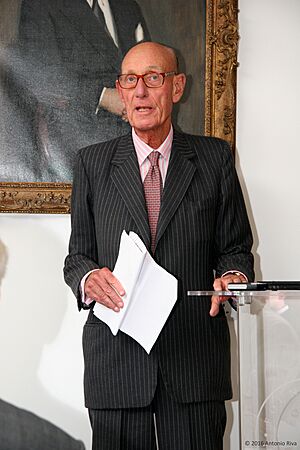Roger Williams (hepatologist) facts for kids
Roger Stanley Williams (born August 28, 1931 – died July 26, 2020) was a very important British professor. He was an expert in hepatology, which is the study and treatment of liver diseases. He led a special institute in London called the Institute of Hepatology. He was also a professor at King's College London. Professor Williams was also the Medical Director for a charity called the Foundation for Liver Research. This charity helps with liver research in the UK. He also led a big project called the Lancet Commission, which looked into liver disease in the UK.
Contents
Early Life and Education
Roger Williams went to school at St Mary's Independent School, Southampton in Southampton. He then studied medicine at The London Hospital Medical College. He finished his medical degree in 1949. After serving in the army, he worked at the Postgraduate Medical School in London. From 1959 to 1965, he was a lecturer at the Royal Free Hospital. He worked in a special liver unit there. He also spent a year studying in New York.
Pioneering Liver Research
In 1966, Roger Williams became a consultant at King's College Hospital. He started a special unit there. This unit focused on researching liver problems. It brought together scientists, doctors, and surgeons.
First Liver Transplants
Working with Sir Roy Calne, Professor Williams helped start liver transplantation in the UK. The very first liver transplant at King's College Hospital happened on September 28, 1968. This was a huge step forward in medicine.
Helping Patients with Liver Failure
Professor Williams also did important work on acute liver failure. This is a very serious condition where the liver suddenly stops working. He helped create the first special unit for patients with this condition. In 1992, King's College London recognized his work. They named his unit the Institute of Liver Studies.
Continued Research and Leadership
In 1996, Professor Williams moved to a new research institute. This institute was at University College London. It was funded by the Foundation for Liver Research. Here, he started new studies. These included living donor liver transplantation. This is when a part of a healthy person's liver is used for a transplant. He also worked on devices to help support the liver temporarily. In 2016, he returned to King's College Hospital. He moved the Institute of Hepatology back to that hospital.
Awards and Recognition
Professor Williams received many awards and medals for his work. One of the most important was the Distinguished Achievement Award. He received this from the American Association for the Study of Liver Disease in 2013. He was the first British person to get this special honor.
Other Important Awards
- In 2004, he received the Senior Achievement Award. This was from the American Society of Transplantation.
- In 2008, he got the Hans Popper Lifetime Achievement Award.
- In 2011, he received the Distinguished Service Award. This was from the International Liver Transplant Society.
He was also a Fellow of the Academy of Medical Sciences. He was an honorary member of several important medical colleges. He helped start the European Association for the Study of the Liver (EASL). He was its Chairman in 1983 and Honorary President in 2008. In 1993, he was given the CBE award. This was for his great service to medicine. He wrote about 3,000 papers, chapters, and reviews. These were published in scientific journals and books. In 2010, he was named the most cited researcher in his field. This means his work was referenced by other scientists very often.
Later Life
Professor Williams continued to practice medicine. He worked at King's College Hospital. He also worked at the Harley Street Diagnostic Clinic. He continued his work until he passed away in 2020.
Interests Outside Medicine
Outside of his medical work, Professor Williams had many hobbies. He loved opera and piano music. He also enjoyed sports. He played tennis and enjoyed yacht racing. He was a member of two famous yacht clubs.
He passed away on July 26, 2020, at the age of 88.


